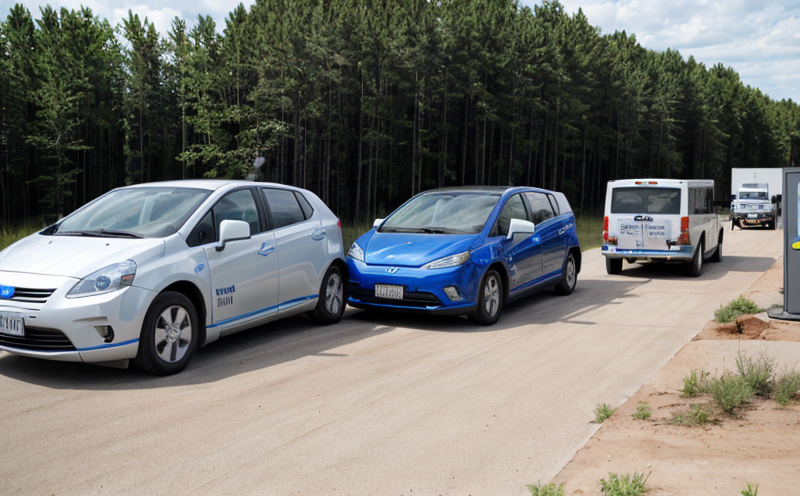SAE J2799 Fuel Cell Communication Protocol Testing
The SAE J2799 standard provides a framework for communication between fuel cells and the vehicles or systems they power. This protocol ensures seamless data exchange, critical for monitoring performance, diagnosing faults, and optimizing operation of fuel cell systems. In today’s rapidly evolving energy landscape, where renewable energy sources are becoming increasingly indispensable, ensuring robust communication protocols is paramount.
SAE J2799 defines the physical layer, link layer, and application layer for communication between fuel cells and their associated electronic control units (ECUs). This protocol supports various data types such as status reports, error codes, diagnostic information, and operational parameters. The standard aims to provide a universal interface that enhances compatibility across different vehicle and fuel cell systems.
The testing of SAE J2799 compliance involves several critical aspects:
- Physical Layer Testing: Ensuring the correct signaling between the fuel cell and ECUs.
- Link Layer Testing: Verifying data integrity and error correction mechanisms.
- Application Layer Testing: Confirming that all required data types are correctly transmitted and received.
Compliance testing is essential for ensuring interoperability, reliability, and safety in fuel cell systems. Non-compliance can lead to operational inefficiencies, increased maintenance costs, and potential system failures. Our laboratory employs state-of-the-art equipment and methodologies to ensure accurate and reliable test results.
The importance of SAE J2799 testing cannot be overstated, especially as the automotive industry continues its transition towards more sustainable energy sources. This protocol is not only a technical standard but also a critical enabler for the widespread adoption of fuel cell technology in vehicles and other applications.
Our team of experts ensures that all tests are conducted according to the latest versions of SAE J2799, ensuring that our clients meet current regulatory requirements and stay ahead of industry trends. By leveraging our comprehensive testing capabilities, you can be confident that your fuel cell systems will meet or exceed expectations.
Scope and Methodology
The scope of SAE J2799 testing encompasses the entire communication protocol between fuel cells and their associated ECUs. This includes physical layer testing, link layer testing, and application layer testing. Each aspect is crucial for ensuring that data exchange is reliable, efficient, and error-free.
Physical Layer Testing: The physical layer of SAE J2799 focuses on the signaling between fuel cells and their ECUs. This involves testing the electrical characteristics such as voltage levels, current limits, and signal integrity. Ensuring these parameters meet the specified standards is critical for maintaining system reliability.
Link Layer Testing: The link layer ensures data integrity and error correction during transmission. This includes testing mechanisms like checksums, cyclic redundancy checks (CRC), and other error detection techniques. Successful completion of this stage confirms that data can be transmitted accurately between components without loss or corruption.
Application Layer Testing: The application layer focuses on the specific data types required for monitoring fuel cell performance. This involves verifying that all necessary parameters such as temperature, pressure, voltage, and current are correctly transmitted and received. Successful testing at this stage ensures that all critical operational data is available to maintain system efficiency and safety.
Our methodology adheres strictly to the latest versions of SAE J2799, ensuring that our tests are both accurate and up-to-date with industry standards. We use advanced test equipment and rigorous protocols to ensure compliance with all relevant sections of the standard.
Why Choose This Test
Selecting SAE J2799 fuel cell communication protocol testing is essential for several reasons:
- Regulatory Compliance: Ensuring your products meet international standards such as SAE J2799 helps avoid regulatory issues and facilitates market entry.
- Innovation: Stay ahead of competitors by ensuring that your fuel cell systems are fully compatible with the latest communication protocols.
- Reliability: Reliable communication is critical for maintaining system performance and preventing costly downtime. Our tests ensure that all data exchange functions flawlessly.
- Safety: Properly functioning communication protocols enhance safety by ensuring timely detection of potential issues, allowing for prompt corrective actions.
- Interoperability: SAE J2799 ensures compatibility across different fuel cell systems and vehicles, promoting seamless integration within the broader energy ecosystem.
By choosing our testing services, you gain access to a team of experienced professionals who understand the intricacies of the standard. We provide thorough, accurate tests that help you achieve your goals in fuel cell communication protocol compliance.
International Acceptance and Recognition
The SAE J2799 fuel cell communication protocol is widely recognized and accepted by major global standards organizations. It has been adopted by leading automotive manufacturers, research institutions, and regulatory bodies worldwide.
- Automotive Manufacturers: Companies like Toyota, Honda, and Hyundai have incorporated SAE J2799 into their fuel cell vehicle development processes.
- Research Institutions: Organizations such as the Fraunhofer Institute and MIT are using SAE J2799 for research and development in fuel cell technology.
- Regulatory Bodies: Agencies like the European Commission and the National Highway Traffic Safety Administration (NHTSA) have included SAE J2799 compliance as part of their certification processes.
The widespread acceptance of SAE J2799 underscores its importance in ensuring interoperability, reliability, and safety across different fuel cell systems. Our laboratory is committed to adhering to this standard, providing you with the confidence that your tests are conducted according to the highest international standards.





